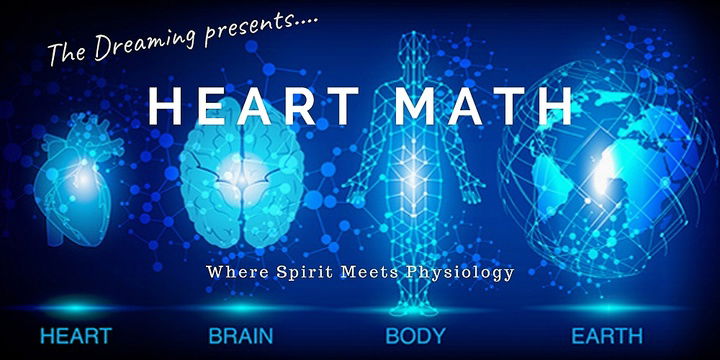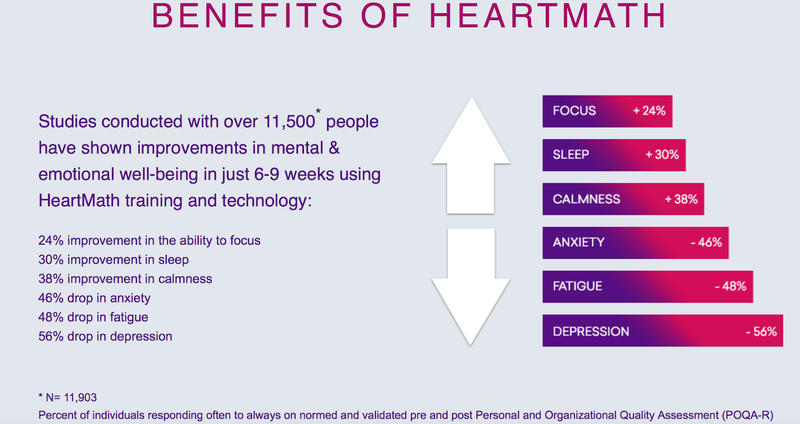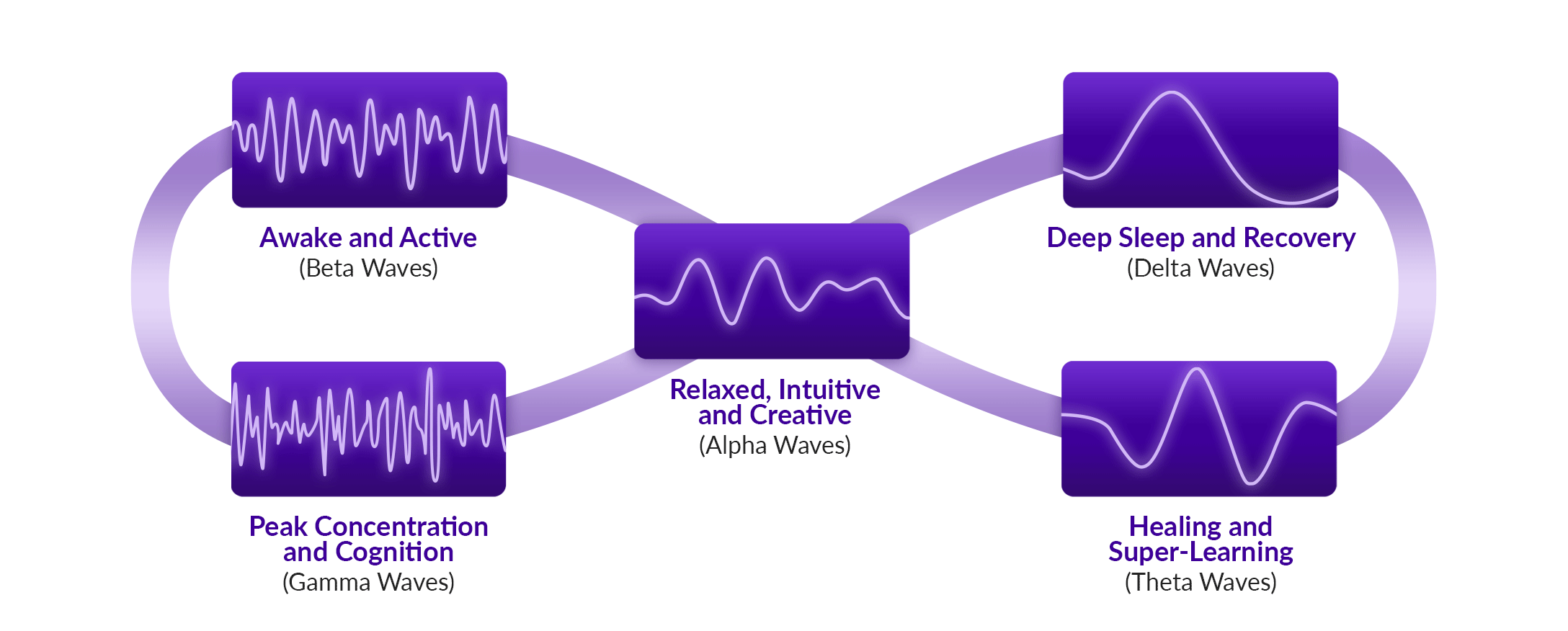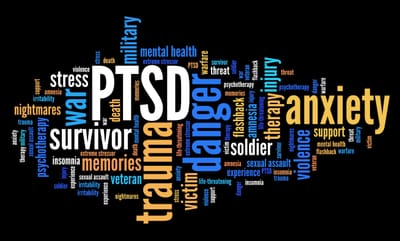Welcome To Integrative NeuroCounseling
Innovative Strategies to Life's Challenges
PTSD Recovery | ADHD Support | First Responder Counseling | Mind-Body Therapies | Neuroscience Consulting & Training
Psychotherapy & NeuroCounseling Services
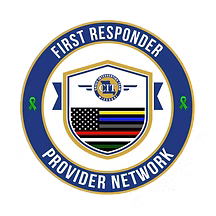
Firefighters, Police & Veterans, EMS, Nurses & Counselors
Reduce Hypervigilance – disentangle complex, critical incidents. Reduce burnout, compassion fatigue, and vicarious trauma. Develop new ways to cope with racing thoughts, flashbacks, anger, and feelings of injustice. Improve Sleep & Circadian Rhythm – Overcome insomnia. Shift Negativity – Reduce fixation on safety and a negative worldview. Reclaim Resilience – Move beyond the cycle of being “wired and tired.” Find Clarity & Calm – Reset, Reboot & Restore. Discover Integrative NeuroCounseling- "more than talk therapy" Book a session today!

NeuroCounseling & Mind-Body Therapies
Enhance Self-Awareness & Mind-Body Connection – Cultivate deeper personal insight and growth. Break Free from Overthinking & Negative Self-Talk. Quiet the mental noise and foster inner peace. Dissolve Toxic Stress & Emotional Overload. Release tension and reclaim balance. Heal from Flashbacks & Emotional Triggers. Process and neutralize unresolved trauma. Strengthen Relationships & Emotional Well-Being. Foster meaningful, fulfilling connections. Improve Mental Clarity & Alleviate Oxidative Stress. Support cognitive health and rejuvenation. Reduce Chronic Pain & Sleep Issues. working with your vagal responses, ANS and feedback loops. Influence pain perception and enhance sleep quality. Boost Immune Resilience & Holistic Well-Being. Build a strong foundation for long-term health.

PTSD, Trauma, Grief & Bereavement
Heal from Trauma & Loss – Gain tools to process grief, bereavement, and life transitions. Navigate the Grief Journey – Find support through grief phases and unexpected “grief bursts.” Reshape Your Inner Narrative – Disentangle from painful stories and honor your experiences. Ease Physical & Emotional Distress – Develop debriefing skills to calm the nervous system. Shift Core Beliefs & Foster Growth – Reframe perspectives for healing. Navigate the Grief Journey and receive support for Life Transitions – Whether adjusting to civilian life, unexpected losses, or a major change, you’re not alone.
Training & Workshops
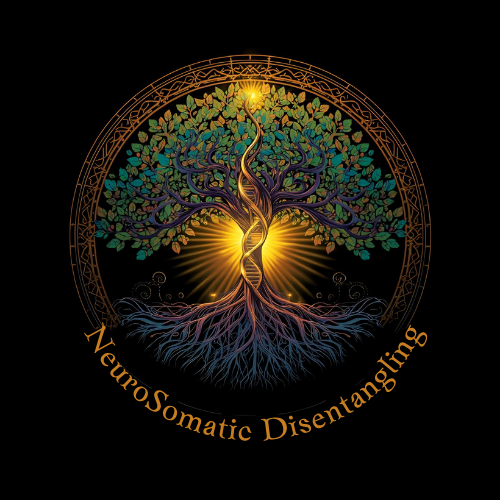
NeuroSomatic Disentangling Method® - Trademark Pending
NeuroSomatic Disentangling Method® Coaching Certification A signature method that transforms the whole person by weaving applied neuroscience, somatic wisdom, and attachment-based healing into one powerful framework. Why it’s different: Works directly with the autonomic nervous system for regulation and attachment, creating resilience. Engages the emotional center (limbic center- feelings, emotions, states, disentangling maladaptive neural patterns and balances subconscious & conscious processes. Identifies and shifts core beliefs that keep people stuck, conditioned responses, and updates core beliefs and the authentic self. Mind-Body Integration techniques work with the fascia and body memory, working with the vagus nerve and somatic release and lasting change on multiple systems. Aligns all parts of self—mind, body, and spirit—for true integration. Applies neuroscience in a specific, progressive sequence for sustainable results This training is a deep dive into whole-person transformation, with three levels of mastery certification or a personal development track at a reduced cost. 📖 Book Coming 2026 — Be the first to experience these methods by joining our Beta Testing Group. See- NeuroTransformationalGroup.com
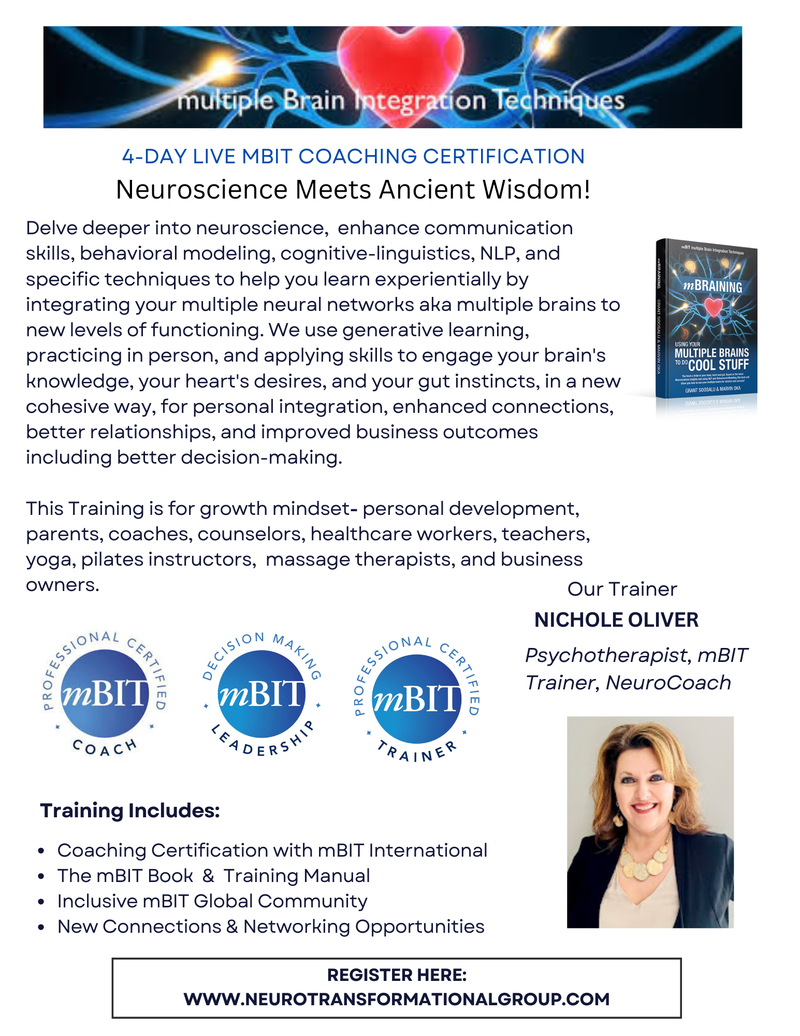
Multiple Brain Integration Techniques (mBIT) Coach Certification 4-Day In-Person Course
Immerse yourself in the world of mBraining to integrate head, heart, and gut intelligence. Feeling stuck, drained, or unsure of your next step personally or professionally ? Struggling with decision-making, low energy, or a lack of deep connections? You’re not alone—and you don’t have to stay there. Our 4-day mBIT Coaching Certification is designed to help you integrate the wisdom of your head, heart, and gut. By aligning your multiple brains, you’ll discover how to: Break free from indecision and uncertainty Restore energy and resilience Create clarity and confidence in your choices Build deeper, more meaningful connections—with others and yourself This internationally recognized program blends neuroscience, behavioral modeling, cognitive linguistics, and intuition. It’s a proven method that rewires unhelpful patterns, expands wisdom, and supports lasting transformation. Whether you’re a coach, counselor, educator, leader, or wellness professional, mBIT is a versatile modality that can stand alone or enrich your current practice. Step into a proven method that rewires patterns, expands wisdom, and creates lasting transformation.
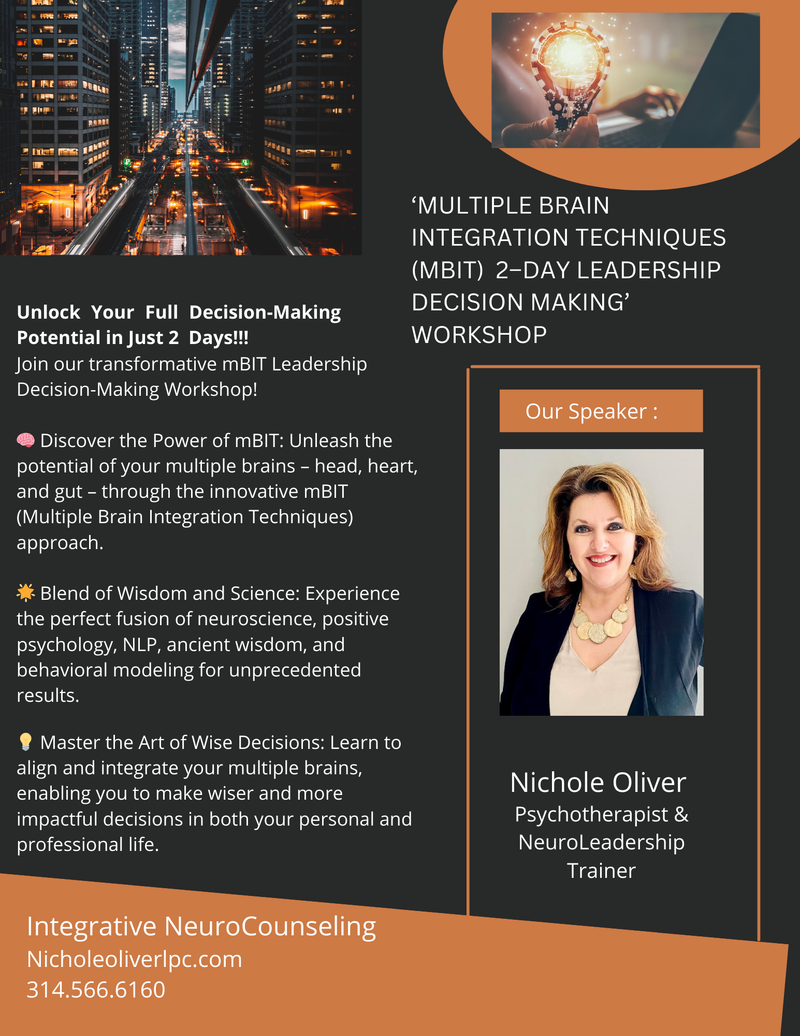
Multiple Brain Integration Techniques (mBIT) Leadership 2-Day Workshop
In today's rapidly changing world, decision-making has become more complex and volatile than ever. This training equips you with powerful techniques to: Lead complex emergent change Enhance decision-making clarity, confidence, and trust Overcome mind biases and blind spots Harness intuitive intelligence from others Tap into the 9 Prime Functions for diverse abilities Understand the 5 classes of mBIT Neural Integration Constraints Achieve stress relief with 'mBIT Balanced Breathing' Utilize the 'mBIT Foundational Sequence' for generative decision-making Access the 'Highest Expressions' of multiple brains for wiser decisions
About the Owner

Nichole's toolkit includes Certified in Eye Movement Desensitization Reprocessing (EMDR) and NLP Master Practitioner Certification. Nichole's dedication to lifelong learning is evident in her intensive training in Somatic and Mind-Body Therapies. Specifically, Attachment-Based interventions, Interpersonal Neurobiology, Memory Reconsolidation, and Polyvagal Theory which foster lasting healing and personal growth. Her most recent accomplishments include becoming a Trauma-Sensitive HeartMath Certified Practitioner, achieving dual certification as a Multiple Brain Integration Technique (mBIT) Coach and Certified Trainer.
Nichole's academic path led her to the attainment of a Masters of Counseling Degree from Lindenwood University and a Bachelor of Science in Business Management and Psychology from Central Methodist University. Nichole's early quest for knowledge also led her to the Lutheran School of Nursing and Liberty University for Philosophy and Religious Studies.
Nichole is a valued member of prestigious organizations, including The American Counseling Association, the International Association of Trauma Professionals, The Society for Neuroscience, The International Crisis Intervention Team, and The American Academy of Experts in Traumatic Stress. Nichole is a member of the Missouri First Responder Network. (https://mofrpn.org/).
Call Nichole Today! (314) 551-9221
Fee schedule
First Responders, Police, and Veterans *Reduced Cost Services*
MOST POPULARInsurance- Self-Pay & In-Network vs. Out-of-Network
Healing Rooted in Neuroscience, Attachment, & Trauma-Informed

Trauma & PTSD Treatment
- Adaptive Disclosure – Designed for combat veterans, this method helps safely process traumatic experiences at an individualized pace.
- EMDR (Eye Movement Desensitization & Reprocessing) – The gold standard for trauma, EMDR reduces emotional distress by reprocessing traumatic memories.
- Prolonged Exposure Therapy – Gradually confronts traumatic memories to reduce avoidance and distress.
- Trauma-Focused Cognitive Behavioral Therapy (TF-CBT) – Helps reframe trauma-related thoughts and improve emotional regulation.
- Transactional Analysis is a psychological framework that explores how people communicate and relate through three ego states—Parent, Adult, and Child—to understand and improve relationships and behavior.
- Attachment-Based Therapy – Supports individuals with early attachment disruptions, fostering secure relationships.
- Internal Family Systems (IFS) – Harmonizes inner subpersonalities to promote emotional integration.
- Gottman Couples Counseling – Strengthens relationships through science-backed communication strategies.
- Humanistic Approach – Honors personal uniqueness and life experiences, empowering clients as the experts of their own healing.
- Polyvagal Theory – Helps regulate the autonomic nervous system for emotional balance.
- Somatic Therapies – Uses body awareness to relieve trauma and PTSD symptoms.
- HeartMath Biofeedback – Supports heart-brain coherence through breathing and stress-reduction techniques.
- NeuroCounseling – Integrates brain science with psychotherapy to enhance emotional resilience.
- Memory Reconsolidation – Strengthens and stabilizes new, healthier neural pathways.
- Neuro-Linguistic Programming (NLP) – Rewires subconscious patterns for improved self-awareness and communication.
- Solution-Focused Brief Therapy (SFBT) – Identifies strengths and resources to create actionable steps for change.
- Existentialism/Logotherapy – Cultivates purpose and meaning in life’s challenges.
- Jungian Theory – Explores archetypes and individuation for personal growth and self-discovery.
- Multiple Brain Integration Techniques (mBIT) – Aligns head, heart, and gut intelligence for decision-making and emotional balance.
Whether you're overcoming trauma, strengthening relationships, or enhancing mental clarity, my neuroscience-based, trauma-informed approach provides the tools to create lasting transformation.
🔹 Schedule Your Consultation Today! (314) 551-9221 🔹
NeuroTechnology Tools Harnessing Optimal Well-Being!
Cutting-Edge Mind-Body Wellness Technologies
4D Massage Chair With AI Technology
Mind-Body Relaxation (see video click on YouTube link)Intelligent Mechanical Hands & SL Track for precise massage. Deep Zero Gravity positioning for spinal relief. Full Body Airbags, Heating System & Bi-Lateral Stimulation for circulation & muscle recovery.
Read MoreHEART MATH EMWAVE PRO
Heart & Mind Coherence (see video click on YouTube link)Inner Balance™ Trainer – Learn techniques to manage stress & restore energy with HeartMath improve breathwork and reduce anxiety.
Read MoreBrainTap
Relax. Reboot. Revitalize. (see video click on YouTube link)Harness the power of neuro-algorithms to improve: Sleep, Anxiety, PTSD, and Overall Well-Being. Brainwave synchronization for enhanced neuroplasticity & cognitive flexibility. No-effort relaxation with guided brainwave training.
Read MoreNeural Chek- Heart Rate Variability (HRV) Diagnostics
Assess stress, emotional & nervous system (see video click on YouTube link)Heart Rate Variability (HRV) Monitoring – Assess stress, emotional resilience & nervous system balance. Uncover the details of your sympathetic and parasympathetic response, psycho-emotional state, stress responses, and adaptation receptivity.
EMDR Lightbar, Paddles & Sound
Eye Movement Desensitization Reprocessing (EMDR) EquipmentProven EMDR Therapy Equipment – Eye movements, sound & pulsations for trauma processing. Helps unfreeze distressing memories, reducing emotional intensity. "Gold standard" in trauma/PTSD care.
FocusCalm
Reduce Stress & Improve FocusFocusCalm is dedicated to reducing stress and improving focus, leveraging innovative methods and user-centered strategies to promote well-being and enhance productivity.
Apollo Neuro Wearable
Designed for high-stress professions, Apollo Neuro provides gentle neuromodulation during sessions to support nervous system regulation. It can improve HRV, reduce hypervigilance, and increase recovery capacity for first responders.
4D Massage Chair With AI Technology
Mind-Body Relaxation (see video click on YouTube link)
HEART MATH EMWAVE PRO
Heart & Mind Coherence (see video click on YouTube link)
BrainTap
Relax. Reboot. Revitalize. (see video click on YouTube link)
Neural Chek- Heart Rate Variability (HRV) Diagnostics
Assess stress, emotional & nervous system (see video click on YouTube link)
EMDR Lightbar, Paddles & Sound
Eye Movement Desensitization Reprocessing (EMDR) Equipment
FocusCalm
Reduce Stress & Improve Focus
Apollo Neuro Wearable
Blog
“When the World Celebrates and You’re Still on the Clock” offers a compassionate, neuro-informed look at why the holidays can feel heavy, hollow, or emotionally complex for first responders. This piece normalizes mixed emotions, reframes the deeper meaning behind working through the season, and provides practical strategies to find grounding, purpose, and connection. Written by Integrative NeuroCounseling, it honors the unseen sacrifices of firefighters, EMS, police, dispatchers, military, nurses, and frontline professionals—and reminds them that their service creates the very safety that allows others to celebrate.
Read MoreContact
- 2032 Hanley Road, Dardenne Prairie, MO 63368
- Suite 231
